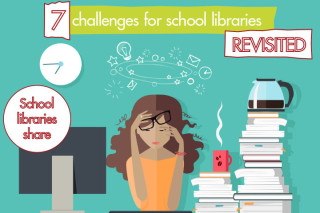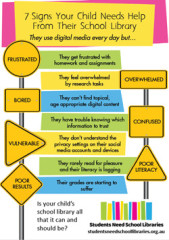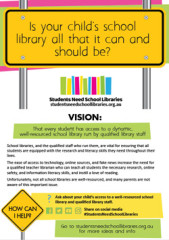- Your School Type
- Solutions
- Resources
- Blog
- Events
- More
- Contact Us
- Book a Demo
- Get a Quote

In 2015, Softlink published our first ‘feature’ document, sharing written comments and feedback provided by respondents to the 2014 Australian School Library Survey. The feature was titled “What are the top 7 challenges for school libraries”, and drew from responses to one of the standard optional questions at the end of the survey “What is one thing you would change about your library or role?”
We used word cloud analysis to identify themes and repetition to come up with final ‘Top 7 Challenges’ list.
Four years on, the original document is still a popular download. Sadly, many school libraries are still experiencing similar challenges and more. We decided to revisit this feature, analysing responses to the same question ‘What is one thing you would change about your library or role?’ from 2018 respondents, this time from across the globe.
This feature highlights the voice of real school librarians, collated into common themes identified from written responses. Many of the broader challenge ‘themes’ are the same or very similar to what was identified in the Australian 2015 feature document. The headings or themes are written to broadly describe the range of comments presented.
A summary of challenges is included below. Read the full feature.
In this section respondents share their challenges and frustrations with their physical library space. Size, outdated fittings and furnishings plus inflexible layouts limit the scope of services these school libraries can provide while position, access and uninviting décor limit their ability to engage students.
The physical library space is not flexible enough to change with the needs of students and staff. It is also too small to cope with rising student numbers.
Our library is grossly undersized for the needs of the school. It is also in very poor physical condition. The combined effect makes the library less usable and safe. It also reduces the ability to implement changes.
In this section, respondents share how they would expand and improve library services with additional staffing and how they are dealing with challenges related to staff resourcing.
I would have an assistant librarian to help with the workload and free up time to develop and run programmes, events and activities.’
For me to maintain my current workload and offer new programmes and initiatives, I need a part-time staff member.
We have a roll of 1315, much of my time is spent staying on top of the admin and purchasing.
In this section, respondents describe how they struggle to juggle their multiple responsibilities, how lack of time creates a major obstacle to success, and what they could do if they had more time.
I would like to have more time for promoting the library and adding digital resources to our library system.
I would like more time to locate resources that complement the new curriculum.
I would like more time to develop library lessons (research, referencing, and general information literacy skills).
In this section, respondents describe poor understanding and perception of library services within their school and how at times they feel their skills and qualifications are undervalued, and unrecognised.
I feel that teacher librarians across the board aren’t fully utilised for their skill set, knowledge or ideas. Many of us aren’t seen as teachers, just librarians.
This comes down to the fact that not every principal, deputy or staff member understands what our role actually is or know what we are capable of doing.
School libraries are a key part of the school community and without them many students would be lost. We offer so much more than books and access to the wifi.
I would change my line manager’s awareness of my qualifications and experience (not through lack of trying), so that the library is seen as a default option for certain tasks/lessons/queries/source of help.
So often, someone else is tasked with something that I am trained to do, and would like to do, but I am not given the opportunity.
In this section respondents share their challenges with broader school collaboration as well as their desire to be more involved with curriculum resourcing and embedding research, digital and information literacy skills school-wide.
I would like to be part of a collaborative team to develop research skills, information literacy, and digital citizenship programmes.
I would like better communication with academic departments so that my resources could better reflect the curriculum.
We live in a digital world. Research and information literacy skills need to be on the curriculum and on the timetable. I would like to be involved in preparing our students for living/working in the digital age.
In this section, respondents describe how insufficient budget is a challenge at their school and how they would allocate funds if available to them.
If we had a bigger budget I would implement things such as audiobooks and eBooks.
Not only that I would be able to create reading nooks and attractive, comfortable places for the students to be able to sit and read.
There is no allowance in the budget for makerspaces or other activities.
I resource these with freebies or donations but any shortfall usually comes from my own pocket and is always sourced outside of working hours.
In this section, respondents share how outdated technology and inability to invest in digital resources presents a challenge to them and their capacity to provide a 21C library experience.
I would improve the technology we have available, e.g. a better smart board, iPads, flip tables etc, to develop in accordance with 21st century learning and to be able to incorporate digital literacies into the learning programs.
I would really like to have another 15 laptops available for students to use – which will give us enough to cater for a whole class.
Continued advocacy is important to help to address the challenges school libraries face.
The following two comments, also drawn from the 2018 Softlink School Library Surveys, describe this from the perspective of the school library professional.
Outside our own library, I’m very aware of school libraries being closed or deprofessionalised and it concerns me greatly. It’s long overdue for government to realize the value of libraries staffed by qualified librarians and I hope the #GreatSchoolLibraries campaign will make a big impact.
Thank you for this survey. We (Teacher-Librarians) need evidence like this so we can continue to ‘fight’ for the importance of this position in our schools. A school library is a special and important space and every student should have access to a trained teacher-librarian and a well-resourced collection. I have been a TL for 33 years and I seem to have been part of this fight for at least 30 of those years.
1. Join the Students Need School Libraries / @NeedSchoolLibs (Australia) and Great School Libraries / @GreatSchLibs (UK) campaigns.


2. Print and share the SNSL 7 Signs your child needs help from their school library flyer and poster to promote the importance of school libraries for all students.
Click here to download.
3. Watch and share this video to promote the value of school libraries
4. Participate in the annual Softlink School Library Surveys for an opportunity to have your comments shared in papers like this - watch our blog www.softlinkint.com/blog/ and Twitter page @SoftlinkEdu for opening dates
5. Share this paper to help get the message out